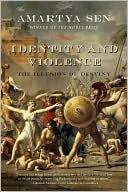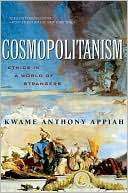
 Identity and Violence: The Illusion of Destiny, Amartya Sen (New York: W.W. Norton, 2006) 224 pp., $24.95 cloth, $15.95 paper.
Identity and Violence: The Illusion of Destiny, Amartya Sen (New York: W.W. Norton, 2006) 224 pp., $24.95 cloth, $15.95 paper.
Cosmopolitanism: Ethics in a World of Strangers, Kwame Anthony Appiah (New York: W.W. Norton, 2006), 256 pp., $23.95 cloth, $15.95 paper.
These two books are the inaugural releases in Norton's Issues of Our Time series, but they are linked by much more than this fact. Each is a measured attack on the cultural separatism prevalent in many academic and policy circles. According to the cultural separatism thesis, cultures or nations are morally central groups in the world; membership in such groups is both ethically significant and explanatorily powerful; and the borders of cultural and national groups must be preserved against outside influence. This thesis is rejected by both Appiah and Sen, in subtly different ways. Each book, moreover, is extraordinarily personal. Appiah and Sen illustrate their theoretical points with reference to their own experiences and the experiences of their families. The books represent excellence in philosophical reasoning, but only philosophers whose relationship to these issues is more than simply academic could have produced these works.
Sen's argument focuses primarily on the ascription of identity. Individual membership in identity-creating groups such as culture—and, in many recent discussions, religion—is often taken by observers to have an explanatory significance. We tend to think we can know a great deal about a person's beliefs in politics and morality, for example, if we know their cultural background. Cultural activists, moreover, frequently insist that this ascription is normative, rather than simply descriptive; there is, on this account, a single proper way of being Muslim or Arab, and it has implications across all strands of a human life. This assumption is not simply inaccurate, writes Sen, but deadly; it insists upon a single form of identification, making all other forms of diversity sources of disagreement and potential violence. Sen defends, instead, a notion of "diverse diversities" (p. 13), by which we have a plurality of forms of identification, both within and between the large-scale cultural and religious markers we tend to emphasize. Being Muslim, on this account, should not be misinterpreted as a marker defining all aspects of human life. Muslim reactionaries, cultural separatists, and academics such as Samuel Huntington all come under fire for making this mistake of distorting human diversity through a false and damaging simplicity.
Appiah shares this concern for complexity in identification, but combines it with a more extensive account of how our moral duties might change when we encounter difference. The assumption of cultural separation, he argues, underlies both the easy, moral indifference of the cultural relativist and the arrogance of the imperialist. These two approaches to difference—making difference sacred, or imposing sameness through force—rest on both epistemic and moral mistakes. What is needed, Appiah suggests, is a serious attempt to learn how to speak to one another across difference, and much of his book is devoted to explaining both the difficulty and the necessity of this process. This fresh start, moreover, will have to teach us both how to speak and how to disagree across cultures. What emerges by the end of Appiah's book is a conviction that most of this process will happen without the help of philosophical reason. In the end, learning to live with difference is more an arational process of acclimatization—of getting used to one another—than a philosophical process of rational argumentation. We must ultimately seek acceptance and familiarity even with those whose beliefs we reject.
There is much in these books that is fascinating and refreshing, as they reject the separatist thesis frequently found in discussions of multicultural politics and cultural rights. Even more interesting for a student of international relations is the effect of such arguments upon the conventional analyses of international law and sovereignty. Many such analyses rely on a notion of coherent social nations, or ways of life, as the foundational units of international politics; we may think of John Rawls's concept of "peoples" in this context. The arguments of Sen and Appiah make the ascription of cultural separateness, and the normative valuation of cultural groupings, that much more complex. As such, their arguments represent a serious addition to the literature on international ethics. If the easy linkage between state self-determination and cultural survival is rejected, the precise contours of the rights and immunities of state agencies may require considerably more thought.
These books, however, might be better read as introducing a research agenda than a final series of conclusions. Both books function best when understood as attempts to rebut the assumptions of contemporary thinking. Their positive analyses, in contrast, remain somewhat underdeveloped. Sen, for example, does not develop the notion of "diverse diversities" to any significant degree. Identifying this phenomenon is useful, but we need more guidance in understanding just how diverse we want our diversities to be. Some ascriptive forms of identity will surely have some impact upon what other forms of identity might be adopted: identifying myself as a philosophical liberal, for example, will likely preclude me from also identifying with a theocratic religious order. Similarly, if I am both Catholic and homosexual, there will be—at the very least—an internal pressure and tension from holding these two identities. It would have been helpful for Sen to provide a more complex analysis of when and how we are right to take some forms of identity as having priority over other forms. The easy assumption that we can explain everything about ourselves with reference to a single strand of identity is surely wrong, as Sen notes. But the fact that some forms of identity determine or shape other forms of identity must also be acknowledged and understood; we cannot ignore the ways in which some of our identities do, and must, take priority over others. A more complex and accurate account of cultural identity, then, would neither always accept nor always reject the idea that some forms of identity will dominate others. Sen is quite right to reject the simple account on which some forms of identity are inevitably dominant; a more complex account of identity, however, would nonetheless accept that some forms of identity place pressure on other acceptable forms of identification. Sen paves the way for this more complex account, but it remains as yet undeveloped.
Appiah's argument, similarly, might stand more in need of amplification than amendment. His solution to the difficulties of speaking across difference is attractive; we should seek to become used to one another's foibles rather than solve all disagreements through force or argument. The difficulty, however, is that we still need some guidance about what sorts of differences we should seek to accommodate. To know everything is not always—or should not be, at any rate—to forgive much of anything. There are some sorts of difference whose evil we ought to keep sharp and focused in our minds; we would be wrong, for example, to lump political fascism together with religious difference, as an example of the sort of difference we should simply cease to find unusual. Appiah would agree, of course; he is no relativist. The difficulty in this case lies only in finding a principle suitable to determine what sorts of difference we ought to normalize. Appiah may be right that toleration across cultures will not be achieved by philosophy; surely, however, philosophy will have something useful to say about how to determine the sorts of toleration we ought and ought not to seek.
All this suggests only that the books ought to be taken as introducing a new direction in research rather than a settled position. Both books are admirable and valuable additions to our literature on global ethics in an age of cultural diversities.
—Michael Blake, University of Washington
More in this issue
Summer 2007 (21.2) • Feature
Uganda's Civil War and the Politics of ICC Intervention
The International Criminal Court's intervention into the ongoing civil war in northern Uganda evoked a chorus of confident predictions as to its capacity to bring ...

Summer 2007 (21.2) • Review
Are Women Human? And Other International Dialogues by Catharine A. MacKinnon
Catharine MacKinnon's fundamental claim is that the violence and abuse routinely inflicted on women by men is not treated with the same seriousness accorded to ...

Summer 2007 (21.2) • Review
A Turn to Empire: The Rise of Imperial Liberalism in Britain and France by Jennifer Pitts
Jennifer Pitts asserts that imperialism was not essential to the liberal project, as is so often alleged by its critics, most recently and systematically by ...
